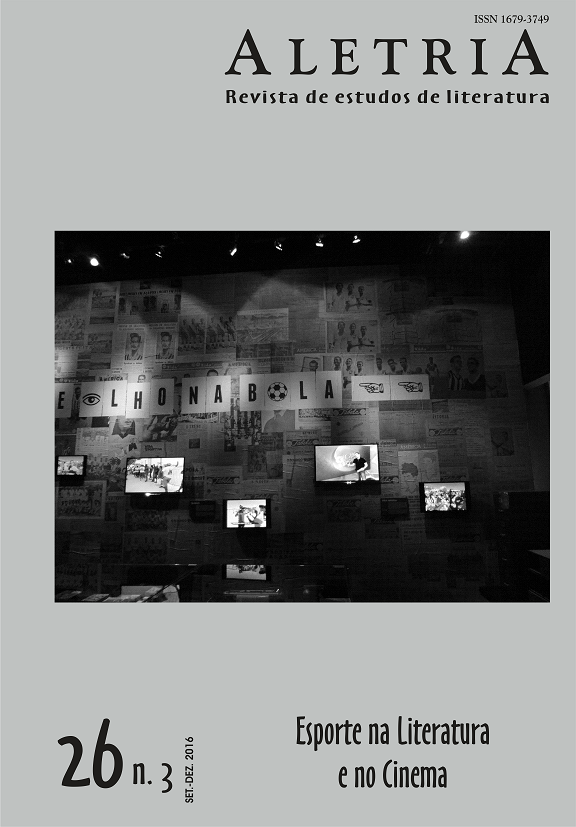So Where Does the Strength to Keep Running Come From? Diasporic Conditions and Olympic Facialities in Hugh Hudson’s Chariots of Fire
DOI:
https://doi.org/10.17851/2317-2096.26.3.231-250Keywords:
Chariots of fire, Olympic Games, national tradition, diasporaAbstract
In 1917, Baron Pierre de Coubertin states in his doctrinal writings, that one of the noblest goals of Olympics “is by excellence, the glorification of youth”. In 1924, Paris hosted the 8th Olympic Games of modern times, in which the motto “Citius, Altius, Fortius” oscillated between the individual will of victory and the pragmatic joints of countries in search of collective and collaborative victories. In this brief study, given its initial framework, we will address the now classic film narrative Chariots of fire (1981), by Hugh Hudson, as it conveys the characterization of the English Delegation in the 1924 Olympic Games. A tense multicultural background distinguishes this group of young athletes, as well as their support teams, with emphasis on substrates marked by two diasporic athletes, the “Flying Scotsman” and the son of a London-based Jewish banker. We reflect on these two lines of political and cultural strength that, among other factors, account for both the conformity to tradition and the dialectic faciality of a heterogeneous and contradictory nationality, which has had constant and successful presence in several modern Olympic Games.
Downloads
References
ANDERSON, Benedict. Comunidades imaginadas: reflexões sobre a origem e a difusão do nacionalismo. Tradução de Denise Bottmann. São Paulo: Companhia das Letras, 2008.
ANDERSON, Benedict. Nação e consciência nacional. Tradução de Lólio Lourenço de Oliveira. São Paulo: Ática, 1989.
BLAKE, William. Jerusalém. Tradução de Saulo Alencastre. São Paulo: Hedra, 2010.
BOGOMOLETZ, Davy. O Hassidismo como visão de mundo: os princípios básicos da ética hassídica. Judaísmo Humanista, 18 maio 2010. In: http://judaismohumanista.ning.com/forum/topics/o-hassidismo-como-visao-de. Acesso em: 20 jun. 2016.
BOURDIEU, Pierre. Programa para uma sociologia do esporte. In: BOURDIEU, Pierre. Coisas ditas. Tradução de Cássia R. da Silveira e Denise Moreno Pegorim. São Paulo: Brasiliense, 2004. p. 207-220.
BOURDIEU, Pierre. Razões práticas: sobre a teoria da ação. Tradução de Mariza Corrêa. Campinas: Papirus, 1996.
CHARRIOTS of fire / Carruagens de fogo. Direção: Hugh Hudson. Produção: David Puttnam. Roteiro: Colin Welland. Inglaterra: Enigma Productions, 1981. 1 CD-Rom (123m), drama, color.
COUBERTIN, Pierre. Olímpicos – seleção de textos. Tradução de Luiz Carlos Bombassaro. Porto Alegre: EDIPUCRS, 2016.
DANS, Peter E. Christians in the movies: a century of saints and sinners. Lanham: Rowman and Littlefield, 2009.
DELEUZE, Gilles; GUATTARI, Félix. Ano zero: rostidade. In: DELEUZE, Gilles; GUATTARI, Félix. Mil Platôs – capitalismo e esquizofrenia. Tradução de Aurélio Guerra Neto et al. Rio de Janeiro: Ed. 34, 1996. p. 28-57.
GUINSBURG, Jacó. (Org.). O judeu e a modernidade: súmula do pensamento judeu. São Paulo: Perspectiva, 1970.
GUTTMANN, Julius. A filosofia do judaísmo: a história da filosofia judaica desde os tempos bíblicos até Franz Rosenzweig. Tradução de Jacó Guinsburg. São Paulo: Perspectiva, 2003.
HALL, Stuart. Da diáspora: identidades e mediações culturais. Tradução de Adelaine La Guardia Resende. Belo Horizonte: Editora UFMG; Brasília: Representação da Unesco no Brasil, 2001.
HOBSBAWM, Eric J. A invenção das tradições. In: HOBSBAWM, Eric J.; RANGER, Terence (Org.). A invenção das tradições. Tradução de Celina Cardim de Cavalcante. Rio de Janeiro: Paz e Terra, 1984. p. 9-24.
HUTCHEON, Linda. Uma teoria da paródia. Lisboa: Edições 70, 1989.
MUCZNIK, Lúcia Liba et al. (Coord.). Dicionário do judaísmo português. Lisboa: Editorial Presença, 2009.
OLYMPIC CHANNEL. The complete London 2012 – opening ceremony. Disponível em: https://www.youtube.com/watch?v=4As0e4de-rI. Acesso em: 10 ago. 2016.
VANOYE, Francis; GOLIOT-LÉTÉ, Anne. Ensaio sobre a análise fílmica. Tradução de Marina Appenzeller. Campinas: Papirus, 1994.
VON MEIEN, Joachim. The multiculturalism vs. integration debate in Great Britain. Munich: GRIN Verlag, 2006.
Downloads
Published
How to Cite
Issue
Section
License
Copyright (c) 2017 Jorge Alves Santana (Autor)

This work is licensed under a Creative Commons Attribution 4.0 International License.
Authors who publish with this journal agree to the following terms:Authors retain copyright and grant the journal right of first publication with the work simultaneously licensed under a Creative Commons Attribution Non-Commercial No Derivatives License that allows others to share the work with an acknowledgement of the work's authorship and initial publication in this journal.Authors are able to enter into separate, additional contractual arrangements for the non-exclusive distribution of the journal's published version of the work (e.g., post it to an institutional repository or publish it in a book), with an acknowledgement of its initial publication in this journal.Authors are permitted and encouraged to post their work online (e.g., in institutional repositories or on their website) prior to and during the submission process, as it can lead to productive exchanges, as well as earlier and greater citation of published work (See The Effect of Open Access).





